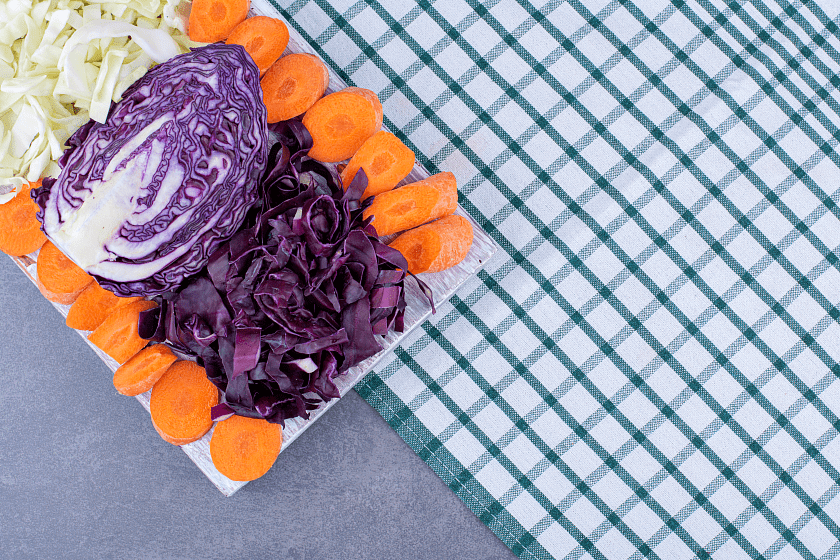Unveiling The Dark Side: The Worst Crash Diets Ever & Their Potential Risks

The two biggest sellers in any bookstore are the cookbooks and the diet books. The cookbooks tell you how to prepare the food, and the diet books tell you how not to eat any of it!
Andy Rooney
We’ve all experienced it... that desperation to lose weight and fast! Whether you’re eager to look great for a big event or are just tired of carrying around extra poundage, it may tempt you to resort to some extreme measures to lose weight by jumping to crash diets.
Though it may not be easy, the only actual way to lose weight healthily is through a reduced-calorie diet and exercise. Here is a list of the worst crash diets ever.
#1. The Cabbage Soup Diet
Most people have tried the cabbage soup diet at one time or another. While the exact formula and soup recipe varies from person to person, the basic idea is that your diet consists mainly of very low-calorie cabbage soup and a few extras, such as fruit and vegetables, which are only allowed on certain days of the diet.
Sound crazy? It really is.
There’s no magic formula other than that most of the allowed foods and the soup itself are super low calorie. Not to mention the fact that most people are so sick of the soup after a couple of days they’d rather eat anything but.
This temporary diet has been used primarily to kick start a weight loss plan, which hopefully involves more food. Long-term, this diet is unhealthy, unsatisfying, and incredibly likely to lead to an all-out binge-leaving the dieter worse-off than before.
#2. The Mono Diet
Mono means 'one'. So, as you can imagine, the mono diet comprises eating only one food for a set period. That food can be anything: dark chocolate, popcorn, hot dogs. You name a food, you can guarantee that someone has made a 'mono diet' out of it.
There's no real theory or scientific backing for mono diets. They just seem to have appeared on the internet out of nowhere. There are a lot of problems with these so-called diets, as you can probably imagine. Firstly, if a person chooses to 'mono' a high-calorie food, it will end in disaster and weight gain.
Secondly, eating only one food is a sure-fire way of depriving the body of the nutrients it needs. And, as with the cabbage soup diet, people will either get so sick of the one food they've chosen that they'll stop eating altogether or go on a binge, both of which are dangerous behaviours.
#3. The Air Diet
The worst diet to make our list is the so-called 'air diet', which is really just a fast track to anorexia. With this 'diet', you mime eating in every way except for the actual eating part.
There is only one rule: eat nothing but a water and salt soup concoction. The concept comes from Breatharianism, which is the belief that one can live only on energy from sunlight and does not need nourishment from food. This diet is dangerous and ineffective, and like all the 'diets' on our list, shouldn’t be attempted.
The Bottom Line
Most people know this, but even if they (and you!) do, it's normal to be tempted by crash diets that promise a quick fix. In reality, however, these diets usually end up doing more harm than good, especially when it comes to the world's worst crash diets.
Embrace Inspiration: Like What You Read? Be Sociable, Comment, And Share It! Thanks.
FAQ
Short-term, intense eating plans are considered crash diets — meaning that your weight is likely to rebound after you finish the program.
Research suggests rapid weight loss can slow your metabolism, leading to future weight gain, and deprive your body of essential nutrients. What's more, crash diets can weaken your immune system and increase your risk of dehydration, heart palpitations, and cardiac stress.
Biologically, dieting can lead to unhealthy changes in body composition, hormonal changes, reduced bone density, menstrual disturbances, and lower resting energy expenditure.
Some people opt for a quicker, more drastic solution: crash dieting. These diets, otherwise known as total diet replacement (TDR) programmes, involve drastically reducing calorie intake to between 800-1,200 calories per day. The usual calorie intake for a woman is 2,000 calories, and for a man, it's 2,500 calories.
Many people are drawn to crash diets because of the promise of quick weight loss. In a society that often values quick fixes and instant results, the appeal of losing weight rapidly can overshadow the potential health risks and long-term ineffectiveness of these diets.
A healthier approach to weight loss includes a balanced diet with a variety of nutrients and regular physical activity. Making gradual lifestyle changes, focusing on portion control and eating mindfully are sustainable ways to lose weight and keep it off for the long term.
Join Our Mailing List
Sign up to receive FREE PDF Report, updates, and special offers from our team




